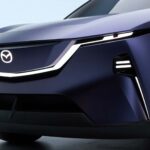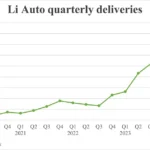Volkswagen is embracing the latest technology upgrades for the 2025 model year, with a focus on enhancing the driving experience through innovative features. One of the key enhancements is the expansion of ChatGPT to process voice commands in most models for 2025. This advanced technology allows drivers to interact with their vehicles in a more intuitive way, but it comes with a catch – users will need a subscription to unlock all the features.
In addition to the ChatGPT integration, Volkswagen is also standardizing a 12.9-inch touchscreen in every 2025 Volkswagen ID electric model. This larger touchscreen will provide drivers with easy access to a wide range of features and controls, making it easier to navigate the vehicle’s systems and settings.
The German automaker is currently in the midst of a transition to electric vehicles, following the successful launch of the Volkswagen ID.4 crossover SUV in 2021. The 2024 model year saw a significant tech reboot for the ID.4, setting the stage for further advancements in the 2025 lineup. However, the highly anticipated 2025 Volkswagen ID.7 has been delayed indefinitely, causing a reshuffling of the existing lineup.
One of the most exciting additions to the 2025 lineup is the arrival of the ID.Buzz, a modern electric successor to the legendary VW Bus. This three-row electric van is powered by a 91-kWh battery pack and a single motor rated at 282 hp. The ID.Buzz offers a range of 234 miles for the single-motor model and 231 miles for the dual-motor model, making it a practical and efficient choice for families and adventure seekers alike.
The 2025 Volkswagen Jetta and Taos models have also received updates for the new model year. The Jetta now features fresh light designs and a standard 8.0-inch touchscreen, while the Taos has been retuned for improved performance. Both models offer a range of standard safety and convenience features, making them versatile and reliable options for daily driving.
In addition to the new models, Volkswagen is also updating its existing lineup for 2025. The ID.4 electric crossover, Atlas and Atlas Cross Sport SUVs, Golf GTI, and Golf R are all carrying over from the previous year with some enhancements. The Golf GTI and Golf R, in particular, are receiving refreshed styling, increased standard equipment, and improved technology features.
Looking ahead, Volkswagen is gearing up for the launch of the redesigned 2025 Tiguan compact crossover SUV, which is set to enter its third generation later this year. With a focus on electric and hybrid technology, advanced safety features, and cutting-edge infotainment systems, Volkswagen is poised to continue leading the way in automotive innovation for years to come. The Impact of Social Media on Mental Health
In recent years, social media has become an integral part of our daily lives. From Facebook to Instagram to Twitter, we are constantly connected to these platforms, sharing moments and updates with our friends and followers. While social media has its benefits, such as staying connected with loved ones and networking professionally, there is also a dark side to its usage that is often overlooked – its impact on mental health.
One of the biggest issues with social media is its potential to exacerbate feelings of loneliness and isolation. Studies have shown that excessive use of social media can lead to feelings of FOMO (fear of missing out), as users compare their own lives to the seemingly perfect lives of others. This can create a sense of inadequacy and low self-esteem, as individuals feel pressure to live up to the unrealistic standards set by social media influencers.
Another harmful aspect of social media is its role in promoting unhealthy body image ideals. Platforms like Instagram are filled with filtered and edited images of flawless bodies, which can lead to body dissatisfaction and eating disorders among users, especially young women. Constant exposure to these images can distort one’s perception of beauty and lead to negative self-image issues.
Moreover, social media has been linked to increased levels of anxiety and depression. The constant need for validation through likes and comments can create a sense of dependency on social media for self-worth. Additionally, cyberbullying and online harassment are prevalent on these platforms, causing emotional distress and trauma to victims.
Despite these negative effects, social media can also be a source of support and comfort for individuals struggling with mental health issues. Online communities and forums provide a safe space for users to share their experiences and seek advice from others who may be going through similar challenges. Mental health organizations and professionals have also utilized social media as a platform to raise awareness and provide resources for those in need.
In conclusion, while social media has its perks, it is crucial to be mindful of its impact on our mental health. Setting boundaries for usage, practicing self-care, and seeking help when needed are essential steps in maintaining a healthy relationship with social media. By being aware of the potential risks and taking proactive measures to protect our mental well-being, we can navigate the digital world more mindfully and responsibly.







